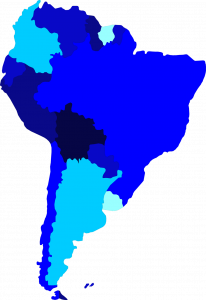Data Security and Intellectual Property Considerations When Nearshoring Development in Latin America
Table of Contents
Nearshoring development to Latin America offers numerous benefits to American companies, including access to a large pool of talented professionals and cost-effective solutions. However, Nearshoring development also presents unique challenges, particularly in the areas of data security and intellectual property protection.
Table of Contents
In this blog, we will take a closer look at the challenges associated with data security and intellectual property protection when Nearshoring to Latin America and provide guidance on how to address these challenges.
1. Data Security Challenges
When it comes to data security, Nearshoring development in Latin America can present challenges due to differences in data protection laws and regulations. It is essential to ensure that your Nearshoring partner is compliant with local data protection laws and regulations, and has appropriate security measures in place to protect your data.
One of the primary concerns with Nearshoring development is the risk of data breaches. According to a report by the Ponemon Institute, the average cost of a data breach in the United States is $8.19 million. To mitigate this risk, it is essential to work with a Nearshoring partner who has robust data security policies and practices in place. This includes measures such as encryption, multi-factor authentication, and regular security audits.
Another data security concern is the use of unsecured networks and devices. When Nearshoring development to Latin America, it is essential to ensure that your Nearshoring partner is using secure networks and devices to access your data.
2. Intellectual Property Considerations
Intellectual property protection is also a significant concern when Nearshoring development to Latin America. It is crucial to ensure that your Nearshoring partner has appropriate measures in place to protect your intellectual property, such as non-disclosure agreements and employee training on intellectual property protection.
One of the primary intellectual property concerns when Nearshoring development is the risk of misappropriation or theft of trade secrets. This risk can be mitigated by working with a Nearshoring partner who has a solid reputation for protecting intellectual property and by implementing robust measures for protecting trade secrets.
Another intellectual property concern is the ownership of intellectual property created during the Nearshoring development process. To mitigate this risk, it is essential to ensure that ownership rights are clearly defined and agreed upon in advance.
3. Key Considerations for Successful Nearshoring
To ensure successful Nearshoring development in Latin America, it is essential to consider the following:
- Choose the right partner: When selecting a Nearshoring partner, it is essential to consider their experience, reputation, and track record for data security and intellectual property protection.
- Ensure compliance with local regulations: Nearshoring partners must comply with local data protection and intellectual property laws and regulations.
- Implement robust data security measures: Data security measures should include encryption, multi-factor authentication, and regular security audits.
- Protect intellectual property: Robust measures should be implemented to protect intellectual property, such as non-disclosure agreements and employee training on intellectual property protection.
Table 1: Data Breach Costs by Country
| Country | Average Cost of Data Breach (USD) |
| United States | $8.19 million |
| Brazil | $1.24 million |
| Mexico | $1.38 million |
| Argentina | $1.22 million |
| Colombia | $1.15 million |
(Source: Ponemon Institute)
Table 1 illustrates the cost of data breaches by country. While data breaches are costly in the United States, they are also significant in Latin American countries. This highlights the importance of data security measures when Nearshoring development to Latin America.
Table 2 : Intellectual Property Protection in Latin American Countries
| Country | Intellectual Property Protection Index (0-10) |
| Chile | 6.6 |
| Mexico | 5.2 |
| Colombia | 5.0 |
| Brazil | 4.6 |
| Argentina | 4.3 |
(Source: International Property Rights Index)
Table 2 illustrates the intellectual property protection index for select Latin American countries. While there is variation in intellectual property protection across countries, all countries in the region face challenges in protecting intellectual property. American companies must work with their Nearshoring partners to implement robust measures to protect intellectual property.
While Nearshoring development to Latin America provides several benefits, it is crucial to address the challenges and risks associated with data security and intellectual property protection. By choosing the right Nearshoring partner, ensuring compliance with local regulations, implementing robust data security measures, and protecting intellectual property, American companies can successfully near-shore development to Latin America while minimizing risks to their data and intellectual property.
Visit our exclusive page on Hiring Nearshore Developers to learn more about finding the ideal LatAm talent for your business.
If you’re looking to hire LatAm developers remotely, take a look at our guide on the Top 7 Websites to Hire LATAM Developers in the Americas for more in-depth information.
4. Conclusion
Nearshoring development to Latin America can provide numerous benefits to American companies, but it also presents unique challenges in the areas of data security and intellectual property protection. To mitigate these risks, it is essential to choose the right Nearshoring partner, ensure compliance with local regulations, implement robust data security measures, and protect intellectual property. By doing so, American companies can successfully near-shore development to Latin America while ensuring the protection of their data and intellectual property.



